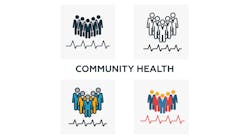Speaking in May 2018 at the HLTH Conference in Las Vegas, Geisinger CEO David Feinberg, M.D., M.B.A., announced a new care delivery protocol at Geisinger, in which patients undergoing routine testing in a number of areas would be offered genetic testing free of charge. On July 9, Feinberg became the first patient of the new clinical DNA sequencing program.
Under the program, patients will be routinely screened to see if they have any gene variations linked to certain diseases. This information will help doctors better treat or even prevent diseases in their patients.
“Understanding our genome’s warning signals will become an essential part of managing our health,” Feinberg said, in a prepared statement. “Participants can now work with their physicians to deal with what their genome reveals long before they become sick. That might involve making lifestyle changes to reduce their risks or understanding future healthcare needs. This allows us to provide truly anticipatory health care instead of only reacting when it may be too late to change the outcome.”
One of the main early goals of the clinical DNA sequencing program is for Pennsylvania -based Geisinger to learn how best to use such genomic testing, screening and counseling on a wide scale, inside a routine clinical setting.
Just as they would for any other screening test, patients in the program will consent to an exome sequencing test. The exome is a very small subset of a person’s DNA. Changes in the exome are closely correlated with potential risk for diseases including many different cancers, heart disease and other health risks. The results – both positive and negative – will be reported back to each patient and then become a part of their medical record.
Until now, this exome screening was being done only through Geisinger’s research program called the MyCode Community Health Initiative. More than 200,000 participants have helped build a biobank of DNA samples to study the relationship between genes and disease. In addition, MyCode has already reported clinical genetic results to more than 700 participants, primarily for significantly increased risks for cancer and cardiovascular disease.
Based on prior experience with MyCode, the integrated health system expects that between 2 and 4 percent of adult patients will learn they have a potentially disease-causing change in one of the 59 genes to be evaluated.
The program is being launched in two clinics initially, the Internal Medicine Clinic at Geisinger Medical Center, Danville, and at the Kistler in Wilkes-Barre. Geisinger plans to eventually offer the new exome screening program to all of its 3 million patients.


